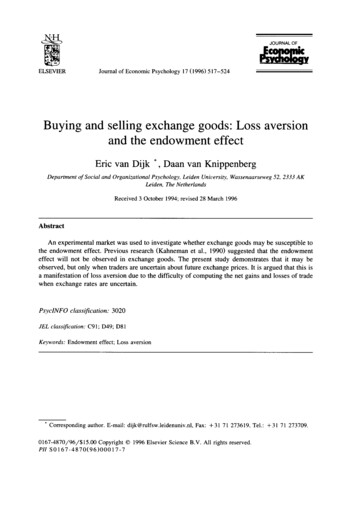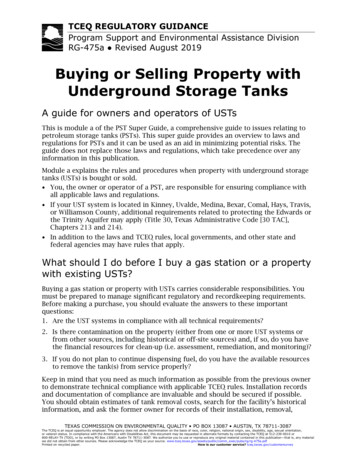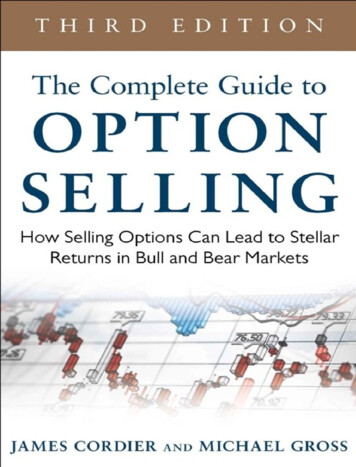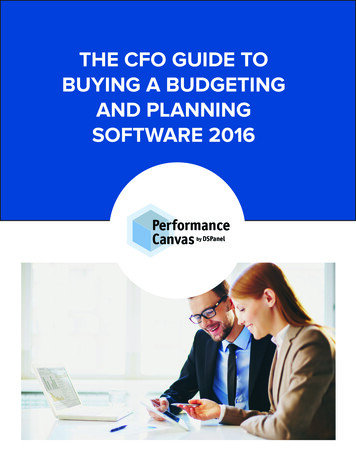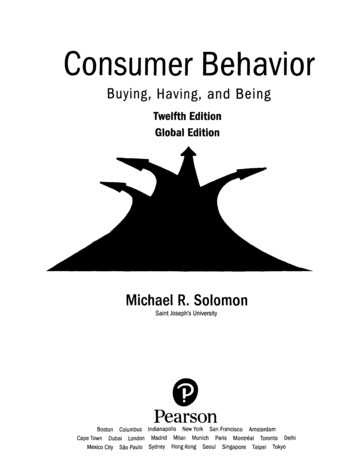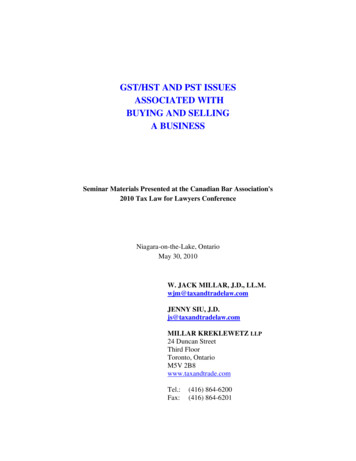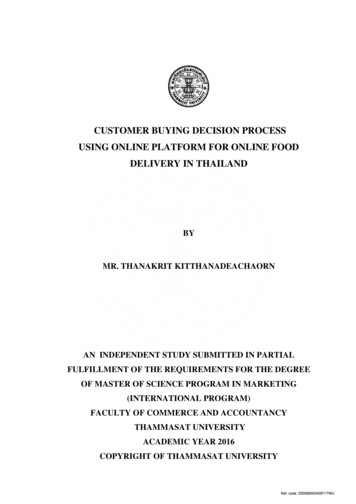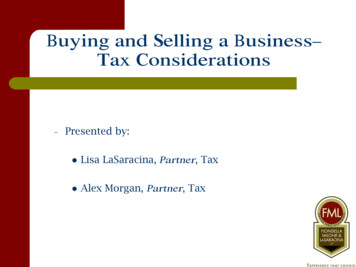
Transcription
Buying and Selling a Business–Tax Considerations–Presented by:Lisa LaSaracina, Partner, TaxAlex Morgan, Partner, Tax
IntroductionBuying or selling a business is a complextransaction. There are many tax variables toconsider, such as:–––––2Structure of transaction (i.e. asset sale versus astock sale)Goals of both Buyer and SellerTypes of entities involved as buyer and seller(corporations, partnerships, LLCs, individuals,etc.)Unwanted assetsHidden liabilities
Structure of TransactionAn existing business can be acquired in twobasic ways:–3The purchaser can buythe Assets of the business; orthe Stock/Ownership Interests (i.e. the stock ofa corporation, a membership interest in an LLC,etc.).
Critical factors in determiningtransaction's structureAmount of tax paid by the seller (character &double tax).Assumption of the business liabilities, includingthose not yet identified.Purchaser's ability to step up the basis ofbusiness assets (generating a tax benefit whenthe assets are sold, depreciated, or amortized).Ability to obtain tax related benefits, such asNOL carryovers.Purchaser's ability to amortize intangibles, suchas customer lists, contracts, or know-how.4
What the Seller WantsSeller's main concerns when a business is soldare minimizing tax on any realized gain andbeing insulated from the business’s liabilities5
What the Seller WantsIf the business is a C corporation, the seller often has a strongpreference for selling stock rather than assets because—Avoidance of potential double taxation which could occur with assetsale;The seller's gain is almost always capital gain, qualifying forpreferential tax rate (currently 20% for 2013); andLiabilities (both known and unknown) associated with the companyremain with the stock6
What the Seller WantsIf the business is a partnership, LLC, or Scorporation:––The negative tax consequences of selling assets (ratherthan the entity) are usually less severe, since the gainon asset sale is passed through to the owners resultingin a single layer of tax.Hidden Issues –Hot Assets in a partnershipOrdinary Income Assets in an S CorporationState Tax for Nonresident owners7
What the Buyer WantsGenerally, buyers prefer to acquire assetsrather than stock.Acquiring assets protects the buyer from assumingthe seller's liabilities (especially contingent orunknown liabilities) which is what happens whenstock is purchased.An asset purchase also allows the buyer to acquireonly the assets it wants.An asset purchase allows the purchaser to step upthe basis of the acquired assets to FMV.8
Taxable Stock PurchaseSeller’s Tax ConsequencesThe seller realizes capital gain or loss equal tothe difference between the sales proceeds andtax basis in the stock.Assuming the stock was owned for over 12months, any gain would be taxed at favorablelong-term capital gain rates (i.e. 20% undercurrent law.)Any value assigned to a non compete is taxed asordinary income9
Taxable Stock PurchaseBuyer’s Tax ConsequencesBuyer obtains basis equal to its purchase price.Basis is not recovered until stock is sold orliquidated.No adjustment is made to the basis of the assetsin the corporation (i.e. carryover basis).Tax accounting method changes may havenegative consequences to buyer10
Taxable Stock PurchaseBuyer’s Tax Consequences (cont.)The corporation's tax attributes (i.e. NOL, capitalloss, and credit carryforwards) remain with thebuyer and are available to offset incomegenerated after the sale.– However, IRC Sec. 382 may limit the use ofthese attributes after an ownership change11
Taxable Stock PurchasePurchasing Stock with a Sec. 338 ElectionWhen a buyer purchases stock, a Sec. 338election treats the purchaser as if assets werepurchased for tax purposes.Why would a Buyer want a §338 election?–12The Buyer is purchasing stock but would like astep-up in the basis of the Target’s assets.
Taxable Asset PurchaseAlthough a purchaser often would prefer topurchase business assets for reasons discussedearlier (e.g., limited liability exposure, basisstep-up to FMV, ability to purchase only desiredassets, and the opportunity to renegotiate orterminate existing unfavorable contracts), thetax cost to the seller is often prohibitive.13
Taxable Asset PurchaseIn certain situations, however, an asset purchasemay be the appropriate structure for a Ccorporation.For example, if the selling corporation has NOLsto offset the gain on the asset sale, or thepurchaser's step-up will be allocated to assetsthat are sold or depreciated very quickly (so thatthe purchaser is willing to increase the purchaseprice by an amount equal or almost equal to theseller's tax cost).14
Taxable Asset PurchaseSeller’s Tax ConsequencesThe selling entity allocates the sales price toeach asset sold using the residual methoddescribed in IRC Sec. 1060.Potential double taxation resulting from 1) Saleof Assets and 2) Liquidating Distribution15
Taxable Asset PurchaseSeller’s Tax Consequences (cont.)If the business is an S corporation, the gain onthe asset sale is generally taxed only once, sincethe gain increases the owner's basis in the entity(reducing any tax on a future liquidatingdistribution).16
Taxable Asset PurchasePurchaser’s Tax ConsequencesBuyer's purchase price is allocated to all theacquired assets using the residual methoddescribed in IRC Sec. 1060.Any purchase price in excess of the acquiredassets' FMV is allocated to goodwill andamortized over 15 years.Buyer is not entitled to any of the acquiredentity's tax attributes (e.g., NOL, creditcarryforwards, etc.).17
Purchasing Stock with a Sec. 338Election2 types of Sec. 338 elections––18Section 338(g) (“Regular” Sec. 338 Election)Section 338(h)(10) Election
Purchasing Stock with a Sec. 338ElectionFor either election:––19The Purchaser must be a corporation.During a 12 month period, the purchasingcorporation must purchase 80% or more of thevote and value of the Target stock.
Regular Sec. 338 Election1.2.3.T's selling shareholders are treated for tax purposes as having soldtheir T stock to P.T is treated as having sold all of its assets at FMV to a new corporation(“New T”).Old T recognizes and is taxed on the full gain and loss on the deemedsale of its assets.–4.5.6.20Thus, it is advantageous to make a Code §338 election for T only in certainlimited circumstances (i.e., T has a large NOL).New T is treated as purchasing old T's assets.New T generally takes a basis for old T's assets equal to the price Ppaid for T's stock.Old T's tax attributes (i.e. NOL and tax credit C/Fs) disappear.
Regular Sec. 338 ElectionPotential Double Taxation–21Because of the potential tax liability at the targetcorporation level (resulting from the deemed sale of thetarget's assets) and the potential additional tax liabilityat the selling shareholder level, a regular Section 338election generally makes sense only in limitedcircumstances.
Regular Sec. 338 ElectionWhen this election makes sense:–––22Target has unused NOL, capital loss, or tax credit carryoversthat will offset the gains and tax recognized as a result of theelection;The use of target tax attributes after the stock purchase willbe limited by IRC Secs. 382-384 if a Section 338 election is notmade;Target holds depreciable property (basis exceeds FMV) suchthat sale generates loss that can be carried back to an incomeyear
Section 338(h)(10) ElectionAn IRC Sec. 338(h)(10) election is a special electionthat can be made when:231.The target corporation is a member of a consolidatedreturn group or;2.When the stock of an S corporation is purchased byanother corporation.
Section 338(h)(10) ElectionThe effect of this election is to treat the acquiredcorporation as if it sold all its assets and thendistributed the proceeds to its shareholders incomplete liquidation.The corporation is taxed on the deemed sale of itsassets, but double taxation is avoided because thetarget is deemed to be liquidated into its parentcorporation tax-free under IRC Sec. 332 if a memberof a consolidated group or it is an S Corp that doesnot pay corporate level taxes.24
Advantages of Sec. 338 Electionsover Direct Asset PurchasesA direct asset purchase of the target's assetsfollowed by a liquidation of the target throughdistributing the sales proceeds to its shareholdersmay achieve approximately the same tax results as aSec. 338 election.However 25
Advantages of Sec. 338 Electionsover Direct Asset Purchases261.The target may have many assets, making thetransfers of title after a direct asset acquisitionexpensive and time-consuming. Also, contracts maynot be transferable in an asset purchase.2.A Sec. 338 election, with the resulting step-up in thebasis of corporate assets, can be made afteracquiring 80% of the target's stock. Thus, in effect,100% of the assets can be stepped up by buying only80% of the target's stock.
Section 338 ElectionsCaution: Note that a disadvantage of either type ofSection 338 election is that the underlyingtransaction is still treated as a stock purchase forlegal purposes. Therefore, the target corporation'sliabilities, including any unknown, undisclosed, orcontingent liabilities, remain intact.27
Other ConsiderationsState Tax–Impact of asset purchase or 338(h)(10) electioncould result in additional state tax forshareholdersInternational––28Stock acquisition acquires the internationalstructure, which could or could not be taxefficientDual Consolidated Losses
Finding Common GroundWhile it may seem that the interests of buyerand seller are always opposed, the desire tocomplete the transaction usually providesmotivation to strike a deal that satisfieseveryone.29
Finding Common GroundSeveral options are available for findingcommon ground The seller could sell assets and demand a higherselling price.The seller could sell stock and accept a lowersales price.The seller could indemnify the buyer withrespect to certain liabilities.The seller could agree to escrow a certainamount of funds to cover future liabilities.30
Selling or Buying PartnershipInterests vs. AssetsWhen the business is operated as a partnership,there is little tax difference between sellingassets and selling an interest in the partnership–31This is because when partnership interests aresold, the sale triggers a liquidation of thepartnership assets into the hands of the buyer.
Selling or Buying PartnershipInterests vs. AssetsIn either case, gains or losses are passedthrough to the partners where they retain theircharacter as capital or ordinary.*** No Double Taxation32
Q & A Session 33
Thank you!/s/ : Alex MorganPartner- Tax/s/ : Lisa LaSaracinaPartner- Taxamorgan@fmlcpas.comllasaracina@fmlcpas.com300 Winding Brook DriveGlastonbury, CT 06033860.657.365134
2 Introduction zBuying or selling a business is a complex transaction. There are many tax variables to consider, such as: – Structure of transaction (i.e. asset sale versus a stock sale) – Goals of both Buyer and Seller – Types of entities involved as buyer and seller (corporations, partnerships, LLCs, individuals,
